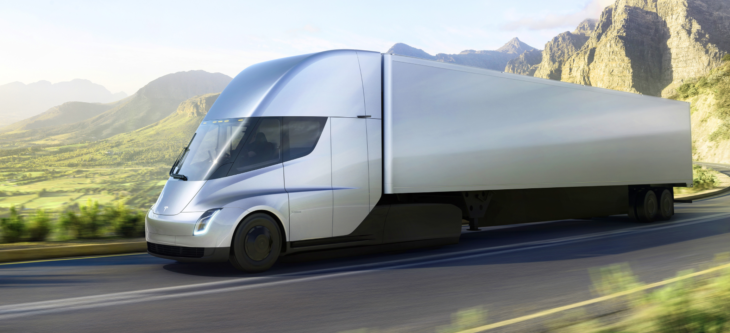CEO, co-founder and product architect Elon Musk is betting his Tesla truck will be a game changer for the $726 billion trucking industry. Musk unveiled prototypes of this Tesla truck on November 16th to a raving crowd that applauded all of the truck’s features. So, we’ve already seen electrical cars hit the market in the form of hybrids as well as fully electric, environmentally-friendly cars. But, what will set Tesla trucks apart from the rest? Well, besides not relying on fossil fuel, Tesla trucks will also be faster and loaded with semi-autonomous driving features making it a first-in-class, self-driving truck for certain scenarios. The benefits they hope to see come to fruition are more accurate just-in-time deliveries, lower-than-average operating expenses, and reduced labor requirements.
“The technological change that benefits trucking and delivery businesses has been widely reported, but in my experience most people that I ask about it focus on the potential negatives rather than looking for opportunities,” wrote Nasdaq.com contributor Martin Tillier. “(Critics) ignore the biggest beneficiary of all: trucking companies. They are looking at a future where two of their major costs, fuel and drivers, will be dramatically lower.”1
What Sets the Tesla Semi Apart from the Rest?
There’s a lot of innovations in the Tesla truck compared to its predecessors. The truck has an “bullet-shaped” aerodynamic design, electric motor and electric powertrain on each axle, amazing speed, travels for an impressive range of miles, and the charging system is pretty mind-blowing too. But, let’s take an even closer look:2
- Speed seems to be the first and most highly touted feature of the Tesla truck. Unloaded, the Tesla semi-truck can go from 0 to 60 m.p.h. in just 5 seconds. Whereas, it takes a conventional diesel semi-truck about 20 seconds to get from 0 to 60 m.p.h.
- The Tesla truck can also climb a 5 percent grade uphill with a full load (80,000 lbs.) at 65 m.p.h. By comparison, a conventional diesel semi truck that is fully loaded can only climb a 5 percent grade uphill at 45 m.p.h.
- Tesla has disclosed that they will use industrial cell batteries for its trucks. A fully charged battery pack will allow the Tesla truck to travel 500 miles. Tesla also announced that they will build a network of high-speed, solar-powered charging systems they call “megachargers.” Tesla claims it will only take 30 minutes to charge the battery pack enough to provide the truck with an additional 400 miles of range. Musk also claims the megacharger will cost approximately 7 cents per kilowatt.
- There are actually four electric motors (same kind used in Tesla’s Model 3 sedan) that operate independently to adjust for pitch, yaw and traction.
- These Tesla trucks will come standard with a sophisticated autopilot system that will keep the truck self-driving and in its lane, as well as make lane changes, make transitions to other freeways, and match speeds of other traffic on the road. The truck is also able to pull in and out of parking spaces by itself.
- Pricing was just announced with a 300-mile version costing $150,000, while a 500-mile version would run $180,000. A ‘Founders Series’ version will also be available for $200,000. Musk says the Tesla semi will cost less than other conventional Class 8 diesel-powered trucks from “Day One.” Musk claims the Tesla truck will cost $1.26 per mile to operate, compared to $1.51 per mile to operate a diesel truck.
- In the cockpit, the driver will have two 15-inch touchscreen displays that will provide navigation mapping, blind-spot monitoring, telematics, maintenance readings, and a fleet management system. There will also be an assortment of cameras strategically placed around the truck.
However, it’s the self-driving technology that has most people worried, since the first death of a pedestrian by a self-driving Uber is still fresh in people’s minds, says attorney Gary Bell of the Denver-based law firm Bell & Pollock, which specializes in truck accident cases. “The industry is putting a lot of faith into a new technology that is still unproven to a certain degree. Obviously, those companies buying these trucks have also got to weigh the liability involved.”
How Will Tesla’s Entry into the Trucking Marketplace Revolutionized the Industry?
Well, other manufactures have now seen the writing is on the wall. The technology and advancements in electronics, software, and technology are an inescapable inevitability. In fact, most manufacturers of commercial Class 8 trucks are secretly designing their own electronic models to counter Tesla’s. They also know the value of automation and how government standards are starting to require a certain amount of crash avoidance technology in all vehicles. Here are some of the commercial manufactures already researching and developing prototypes for electronic trucks:
- Cummins (engine manufacturer)
- Daimler
- Paccar (Kenworth and Peterbilt)
- Tesla
- Volvo
- Nikola
Initially, electric trucks like the Tesla will be outrageously expensive. But, over time as the price comes down on the batteries that will fuel these trucks, it will become a much more efficient alternative to diesel-powered motors. By using electricity, commercial trucking companies will save approximately one-quarter of the fuel costs associated with trucking operations. The entire commercial trucking industry currently doles out roughly $152 billion for diesel fuel each year, so the conversion would end up being a $38 billion savings yearly. No one can know for sure if Musk’s Tesla trucks will be the first to market, but the change to electric trucking is coming. The push for it is real.
1“How Tesla’s Semi Will Dramatically Alter the Trucking Industry” published in Teslarati, Dec. 2017.
2“Tesla Semi FAQ: All the Facts” published in Trucks.com, Nov. 2017.
Resources/Research Links:









